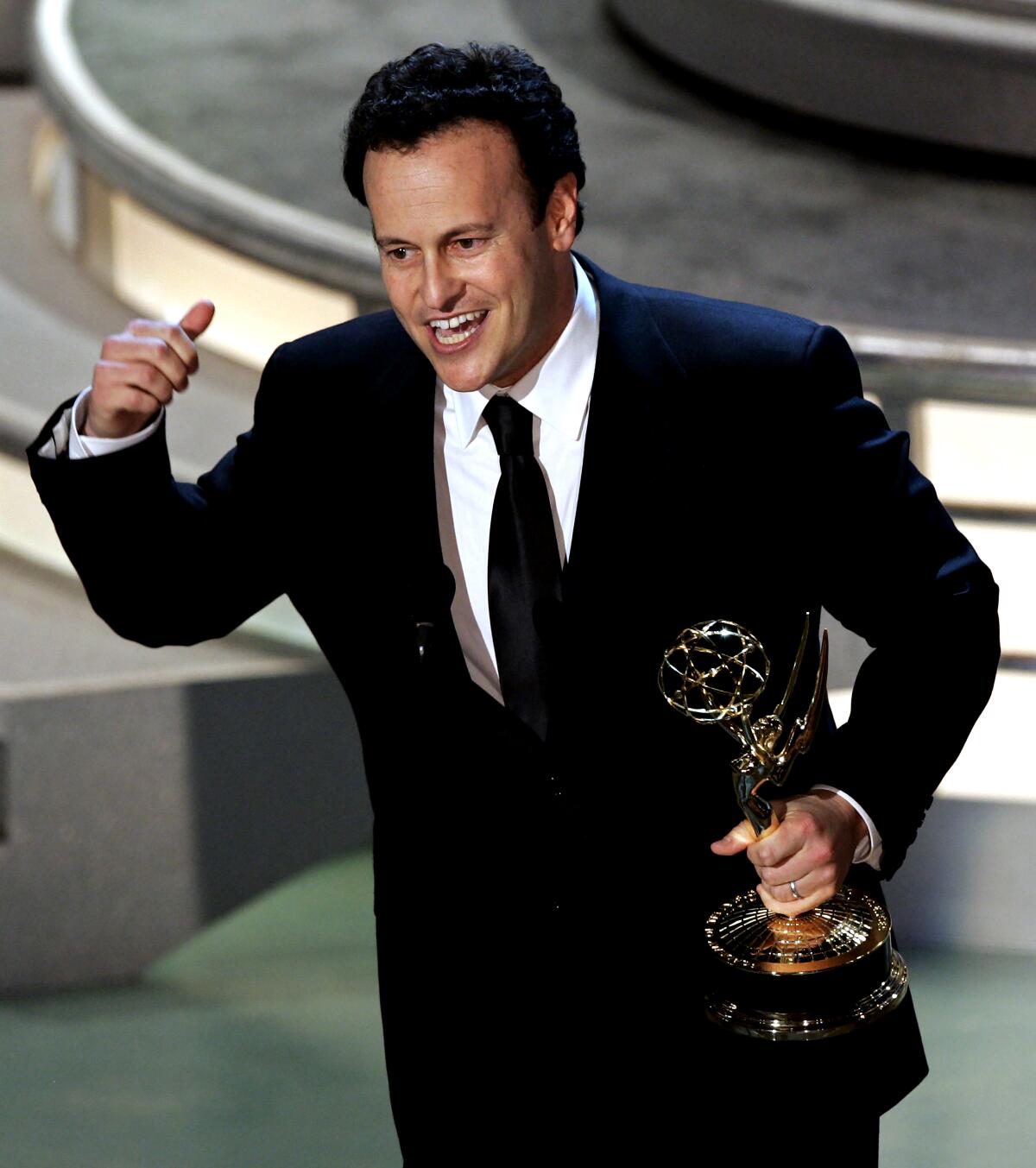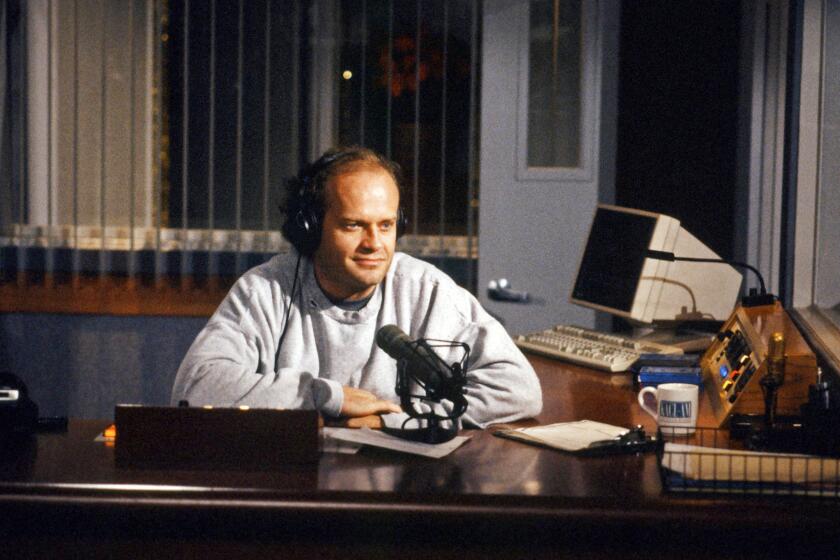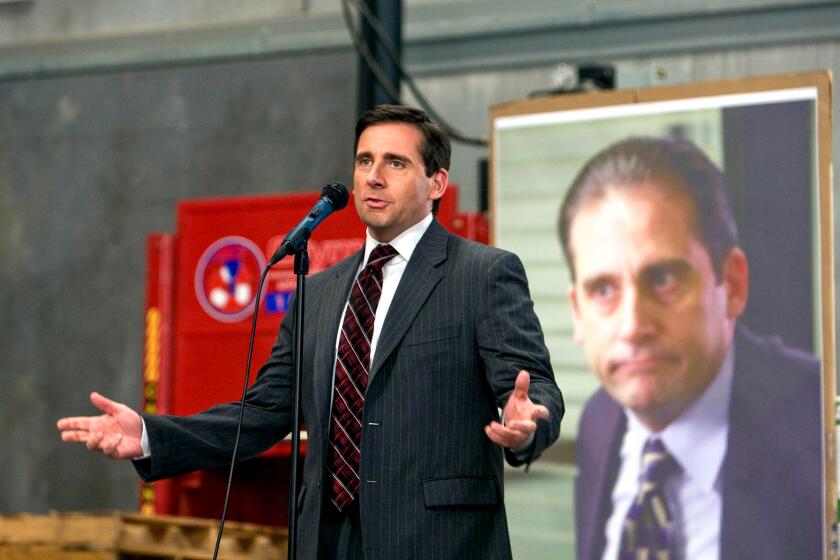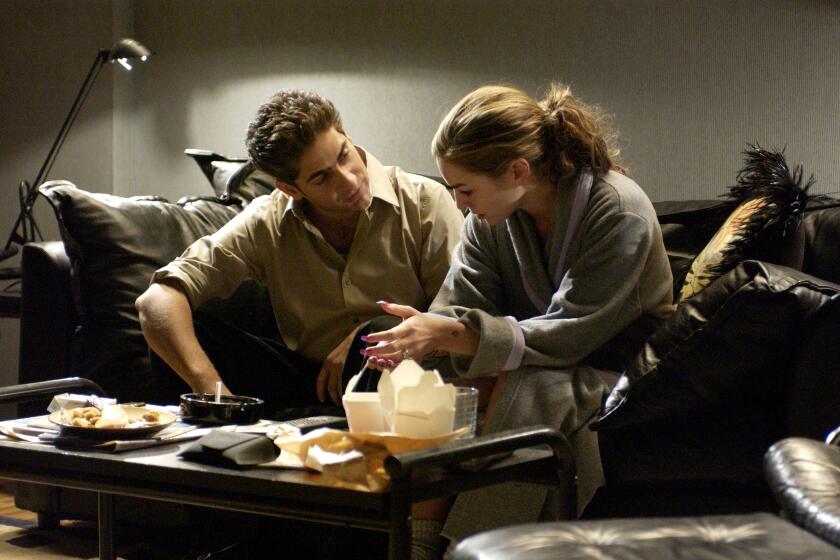‘Arrested Development’ revisited: Jeffrey Tambor’s cameo, plans for another Bluth brother and more revelations

- Share via
In “Inside the Episode,” writers and directors reflect on the making of their Emmy-winning episodes.
“Now the story of a wealthy family who lost everything and the one son who had no choice but to keep them all together. It’s ‘Arrested Development.’ ”
Narrator Ron Howard’s remarks during the opening credits of Mitch Hurwitz’s Fox sitcom told audiences everything they needed to know: It was a family comedy in the most liberal definition of the term; it was a “riches-to-rags” story at a time when the American economy was doing fairly well; and it was a show that enjoyed wordplay.
“Arrested Development” would become a beloved, canceled-too-soon series (which would then get revived on Netflix) and a connecting tissue between Mario Puzo’s Corleone family in “The Godfather” and Jesse Armstrong’s Roy media dynasty in HBO‘s “Succession.”
James Burrows discusses directing the original ‘Frasier’ pilot, including why Peri Gilpin replaced Lisa Kudrow as Roz.
And it was a career rehabilitator for lead Jason Bateman, who played Michael Bluth (the aforementioned “one son”), as much as it was a star-making vehicle for such actors as Will Arnett — who plays older sibling Gob — and Michael Cera — Michael’s son, George Michael.
“These actors go on to such amazing things, but it will still say ‘Arrested Development’ in the middle of their name. I don’t remember it reading ‘Bill ‘My Favorite Martian’ Bixby,’” deadpans creator Hurwitz during a recent Zoom call. “I think it’s kind of indie-sounding.”
Hurwitz won the comedy writing Emmy in 2004 for laboring over the “Arrested Development” pilot. Now, 20 years later, in an interview that has been edited and condensed for clarity, he looks back at the mockumentary that wasn’t really a mockumentary and the love-to-hate (or is it hate-to-love?) Bluth family of Orange County.

Was the show about to be canceled before the Emmy nominations came out?
We were always on the verge of cancellation. I think it had been stated by Rupert Murdoch [the chairman and chief executive of what was then Fox’s parent company, News Corp.] that he actually liked the show but didn’t think it was a Fox show. He thought it was an HBO show. And what I liked about doing it on Fox … was attempting to do an HBO-type show for people just to watch for free. I liked the common-man part of that.
If you were on premium channel HBO, your characters would have been able to curse.
It wasn’t that we were super eager to curse, but it was funny to bleep things. The thing that’s funny is that [the network’s] standards and practices rules are just made up. It’s not like it goes through the House or the Senate or anything. It’s just what we think won’t get us sued — was that you had to cover your mouth. You couldn’t see lip flap. [But] you could say “lip flap” on TV, which I thought was a violation of their whole ethos.
So when Jeffrey Tambor [George] was under house arrest [later in the series], there were all these sensors around the apartment so he couldn’t get out. And [Tony Hale’s] Buster came into the kitchen and saw that the refrigerator had been pulled out, and [George] was going to go through the walls and try to get out of the house. Buster had the line, “Oh, no, when Mom sees that she’s gonna blow a cow,” which is a funny portmanteau. But the [narrator’s] voice-over, which was totally [coincidental], right before it was, “and that’s when Buster found his way around the sensors.”
Howard is an executive producer of the series and was involved with the development. But how did it come that he would narrate it as well?
I was trying to create a show that seemed like it was already in progress. I liked the idea of this really dispassionate observer that would only say what is actually happening. There was going to be no moralizing or anything, and he’d just say it in a very flat, kind of “Frontline” voice. And it just occurred to me that Ron is one of the most trusted voices. He was the most likable character on “Arrested Development” — he and [Cera’s] George Michael.
It was also a bit of a trick because, at that moment, we didn’t really have a big star. And I had done shows that were built around stars, and it had been challenging in a lot of respects. I wanted to do something that was about the story. But you do need stars, and in a way, Ron was that star.
Jeffrey Blitz talks about directing the Emmy-winning ‘Office’ episode ‘Stress Relief,’ the art of cat stunts and comedian Cloris Leachman’s commitment to her craft.
The show also has a sort of mockumentary style to it. This was in the early 2000s when everyone was raving about the British version of “The Office.” Were you intentionally trying to reference that?
The concept that I wanted to do was a full documentary, an awareness of the cameras there. I wanted to have scenes where the cameras got there too late, and you’d see the camera running down the street and catching up at the end of the conversation. And I wanted to have straight-to-the-camera testimonials. And then I saw the British “Office,” which is just such a brilliant show, and I thought, “Well, I can’t do this now.” And it turns out that you can do it and people are still doing it.
I think there’s one thing in an episode where Michael does look at the camera. But just for the extra realism, he actually looks past the camera and to the cameraman.
The other documentary element that I had in the pilot, and it just kind of went away, was I had a brother that didn’t want to appear on camera. It was very lightly [said] in the pilot … [something like] “you kids and your brother.” I wanted to have all the pictures in the house have just one character blurred out. You’d slowly realize, “Oh, he doesn’t want anything to do with this documentary.”
And they were going to call him “Mark.” And I think the joke was going to be that he had that big Gorbachev wine spot on his head. So his name was not “Mark.” It’s just what the family called him. I wanted it to be [played by] Greg Kinnear.
You’d said this cast didn’t have major stars, but the series had a lot of recognizable performers. I assume Henry Winkler, who played the family’s bumbling defense attorney, Barry Zuckerkorn, was cast because he’d worked with Howard on “Happy Days.”
I suggested Henry because of Ron. We’d done a few episodes before this [character appears]. And I remember Jason taking me aside, and we haven’t shot anything yet, and [he] said, “You hired Henry? I thought we were going filmic with this, and we were going to try to do something kind of subtle and indie.” He was a little worried about the TV auspices there. And then Henry came in and he had like this six-page scene where he had to do all the talking and kind of dominate, and he was just hilarious. Jason, to his credit, came over immediately and said, “I cannot believe that I said that.”
I had actually done the same thing with Jason.
I had seen his name and thought that Fox will insist on him. And he had just done all these sitcoms, and it’ll be the thing that makes them feel that this is safe. And so I didn’t like it on that level. But nowhere in that did I know anything about his performance. And then he came in and is Jason Bateman. He’s just so real. And so funny. And so dry. And so present in a scene.
Michael Lembeck talks about directing the Emmy-winning ‘Friends’ episode with guest stars Julia Roberts and Brooke Shields, and how Jean-Claude Van Damme and Andre Agassi’s bad behavior complicated the set.
People also could have misjudged Portia de Rossi, who played Bluth sister Lindsay. Her best-known character before this, the smart and ambitious Nelle on Fox’s “Ally McBeal,” was nothing like Lindsay.
That was not how I saw the character. I [was envisioning] Aida Turturro’s character from “The Sopranos.” Fake bohemian is really what I think it was going to be. Because she lived in Boston for a while and changed her look. And that made sense that the Maeby character [Lindsay’s daughter, played by Alia Shawkat] was going to completely flummox her mom by entering beauty pageants, and she was going to rebel by being a Christian.
Was there any room for improv? Both David Cross, who played Lindsay’s husband, Tobias, and Arnett have ties to that world.
It was so story-driven that there really just wasn’t a lot of room for improv. ... There was a quick flashback to something like David Cross trying on cutoffs and says, “Do these effectively hide my thunder?” That wasn’t scripted. So you can sneak in things like that. I think what was challenging for the actors is that you had to hit all of these story points. It was a complicated thing to weave together in 20 minutes and, for whatever reason, I just had it in my head that every character needed to be served in every episode.
Fittingly, we haven’t talked about Buster, the Bluth child no one takes seriously. This was Tony Hale’s breakout role too.
He sent in a tape because he was in New York. A lot of these guys that came in on tape — Michael Cera did this too — they were so funny that you couldn’t tell if they were being funny.
Now people have lights and a whole setup. But then Michael Cera’s, if I recall, is in his parents’ bedroom, and he’s saying his lines and his eyes are darting around. And I remember Ron saying, “I don’t think he’s doing anything.” But the fact that he sent it to us … I think he might have been doing something?
In Tony Hale’s case, he was too close to the camera and he was rocking. What was written in the script is that Buster approaches Michael and he massages him. But you couldn’t see it. You just saw a guy rocking. But we flew him in [to audition in person], and he was nervous. And this is a great acting lesson, because he used his nervousness for his character.
Terence Winter reflects on writing his Emmy-winning “Sopranos” episode in which Adriana is killed.
You’d worked with Jeffrey Tambor on the comedy “Everything’s Relative.”
When I was writing it, it was going to just be a cameo. I actually think this is a similarity to “Succession.” I think they discovered the same thing I did. Because when you look at the pilot of “Succession,” Brian Cox[’s patriarch Logan Roy] is just peeing in the hallway.
And I had the same plan. I was like, “OK, we’ll have this patriarch go to prison, and we’ll be done with him. And now we can just have the family and the kids in there.” No, you need the sand in the oyster to make the pearl.
My husband used to joke that Jessica Walter, who played steely matriarch Lucille, was doing a heightened version of Kelly Bishop’s Emily Gilmore from “Gilmore Girls.”
(Laughs) I don’t think Jessica knew she was doing Jessica, but there was very little separation. I had brought in Jill Clayburgh [who also was in “Everything’s Relative” and] had never auditioned for anything, and they were making her audition. And Jill is just so winning and so appealing. And she read it and she did kind of this flustered thing [with the dialogue, whereas Walter’s delivery is more jaded].
I remember turning around after she left to look at Peter Chernin [then-president and chief operating officer of News Corp. and chairman and CEO of the Fox Group], and he just said, “No. She’s not this woman.” I looked over at David Nevins, who was executive producer on it, and his eyes looked from his eyes to my forehead, which was sweating.
We didn’t have Gob yet either, and Peter said, “Mitch, you don’t have the brother and you don’t have the mother. This is how pilots go away.”
The casting director, Deb Barylski, jumped up out of her seat and said, “I have Jessica Walter on tape, but I don’t have the tape with me.” And I said, “And she’s amazing.” At that point, I don’t think I knew who Jessica Walter was.
More to Read
From the Oscars to the Emmys.
Get the Envelope newsletter for exclusive awards season coverage, behind-the-scenes stories from the Envelope podcast and columnist Glenn Whipp’s must-read analysis.
You may occasionally receive promotional content from the Los Angeles Times.














